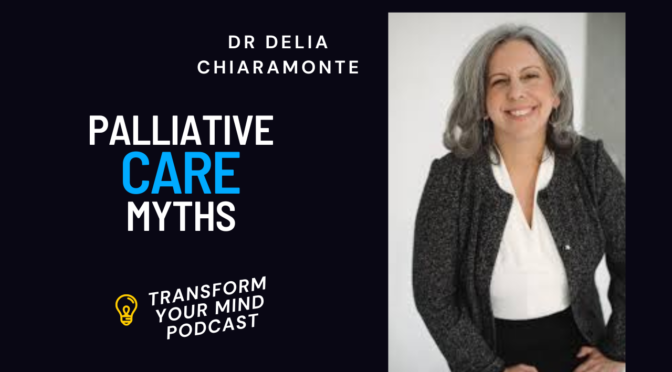In this episode of “Author's Corner,” host Myrna Young interviews Dr. Delia Chiaramonte, author of “Coping Courageously.” They discuss the topic of, palliative care, and debunk common myths surrounding it. Dr. Chiaramonte explains that, palliative care, is not just for end-of-life situations, but rather focuses on symptom management, coping strategies, and making medical decisions for those with serious illnesses. She emphasizes the importance of reducing suffering and offers advice on how to care for loved ones without depleting oneself. You will gain valuable insights on navigating the challenges of caregiving and finding peace of mind.
Download podcast here:
Palliative Care: Reducing Suffering for Patients and Families
Palliative care, is a specialized field of medicine that focuses on providing symptom-focused care for individuals with serious illnesses and their families. Contrary to popular belief, palliative care, is not limited to end-of-life care or hospice. It is a holistic approach that aims to reduce suffering by addressing physical, emotional, and spiritual needs.
Dr. Delia Chiaramonte, a board-certified physician specializing in family medicine, palliative medicine, and integrative holistic medicine, emphasizes the importance of understanding what palliative care truly entails. She explains that, palliative care, is appropriate for anyone with a serious illness, even if they are still seeking a cure. The focus is on reducing suffering, managing symptoms, providing coping strategies, and assisting with medical decision-making.
Palliative Care Myths Debunked
Myth 1: Palliative Care is Only for End-of-Life Care
One of the most common misconceptions about, palliative care, is that it is synonymous with end-of-life care or hospice. This misunderstanding often leads to delayed or inadequate support for patients and their families. This care, can be beneficial at any stage of a serious illness, including when curative treatments are still being pursued.
Dr. Chiarmonte emphasizes the importance of seeking palliative care early, especially when patients are experiencing symptoms that impact their quality of life. The care team can help manage pain, nausea, anxiety, and other distressing symptoms, allowing patients to focus on their overall well-being.

Myth 2: Palliative Care Means Stopping Treatment
Another common myth is that seeking, palliative care, means giving up on curative treatments. However, this can be provided alongside curative treatments. It is not about stopping treatment but rather about enhancing the patient's overall care and well-being.
Dr. Chiarmonte explains that, palliative care doctors, work as part of the care team, collaborating with other specialists to ensure the best possible outcomes for patients. They focus on reducing suffering and improving the patient's quality of life, whether curative treatments are ongoing or not.
Myth 3: Palliative Care is Limited to Medical Professionals
Many people believe that palliative care is solely the responsibility of medical professionals. However, palliative care is a team effort that includes not only doctors but also nurses, social workers, therapists, and even family members. The patient and their loved ones are considered part of the care team, and their input and involvement are crucial.
Dr. Chiaramonte emphasizes the importance of family involvement in palliative care. Family members play a vital role in providing support and care for their loved ones. Setting boundaries and seeking help when needed are essential for preventing caregiver burnout and ensuring the well-being of both the patient and the caregiver.
The Importance of Tough Conversations
One of the challenges faced by families dealing with serious illnesses is having tough conversations. Dr. Chiaramonte acknowledges that these conversations can be difficult but stresses the importance of open and honest communication.
She advises families to create a safe space for discussing the realities of the illness and the potential outcomes. It is essential to validate the patient's feelings and fears while also providing support and hope. By acknowledging the difficult emotions and discussing them openly, families can come together and make informed decisions about the patient's care.
Dr. Chiaramonte encourages families to pray for a cure while also preparing for the possibility that curative treatments may not be effective. Palliative care, can help manage symptoms and improve the patient's quality of life, allowing them to focus on what is most important to them, such as spending time with loved ones or engaging in meaningful activities.

Conclusion
Palliative care, is a vital component of comprehensive care for individuals with serious illnesses and their families. By debunking common myths and misconceptions, Dr. Delia Chiaramonte highlights the importance of early and holistic support. Palliative care focuses on reducing suffering, managing symptoms, and providing emotional and spiritual support, regardless of the stage of the illness.
Understanding the role of care and seeking help early can significantly improve the well-being of both patients and their families. By walking alongside their loved ones on their journey, setting boundaries, and seeking support, caregivers can provide effective care without losing themselves in the process.
It is not about giving up; it is about enhancing the overall care and well-being of patients and their families. By embracing palliative care as part of the care team, families can navigate the challenges of serious illness with compassion, understanding, and hope.
Additional Resources
Connect with Dr Chiaramonte on the web @ https://integrativepalliative.com/caregivers
On Social media
https://www.linkedin.com/in/deliachiaramonte/


